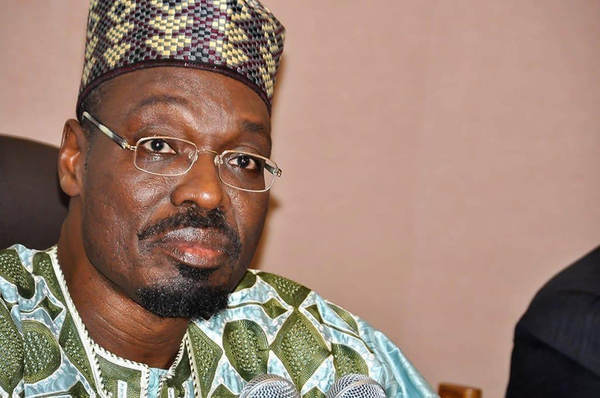- Details
- Politics
Tchiroma’s Exit: Strategic Betrayal or the Start of Northern Cameroon’s Political Reawakening?
By Chongwa Cletus
Yaoundé, Cameroon – June 25, 2025
In a move as symbolic as it is seismic, Issa Tchiroma Bakary—once a staunch defender of President Paul Biya’s decades-long regime—has formally resigned from his post as Minister of Employment and Vocational Training.

The announcement, made in a letter to Prime Minister Joseph Dion Ngute and later relayed to the presidency, signals more than personal disillusionment; it may mark the beginning of a broader political realignment in Cameroon.
“I cannot in good conscience continue to call for the re-election of a system that has failed the very people it claims to represent,” Mr. Tchiroma declared before a crowd of supporters in his hometown of Garoua two weeks prior, foreshadowing the resignation. His words, echoing through the northern plains of Cameroon, laid bare a growing divide between the ruling elite and the regions long seen as the party's electoral strongholds.
A Loyalist Turns Challenger
For close to two decades, Tchiroma served in various high-profile roles, most notably as Minister of Communication, where he became known—sometimes controversially—for his spirited and unwavering defense of the Biya regime.
In one viral interview during the Anglophone crisis, when asked about systemic repression, he famously retorted: “How can you say that?”—a phrase that cemented both his loyalty and his notoriety.
Yet, his reassignment in recent years to a quieter portfolio marked a decline in his visibility and, many suspect, his influence. "He became invisible after leaving the communication ministry," said Emmanuel Mballa, a political analyst based in Yaoundé. “It was only a matter of time before something gave.”
Tchiroma’s recent call for political change and his subsequent resignation have now broken the surface tensions that had long been whispered in elite circles.
A Calculated Departure or Moral Awakening?
Government sources remain tight-lipped. State media outlets like Cameroon Tribune and CRTV—customarily quick to report political updates—have, as of this writing, made no official acknowledgment of the resignation.
“This silence is telling,” said a former CRTV journalist who spoke on condition of anonymity. “It reflects the government's deep discomfort with a crack in its northern flank, a region it has historically relied upon for legitimacy and votes.”
Jean De Dieu Momo, a current Minister Delegate at the Ministry of Justice and a long-time political figure, responded with outrage:
“My brother Issa Tchiroma m’a vraiment surpris... Le président va penser que moi aussi je vais partir !”
Calling the resignation “high treason,” Momo's fiery reaction underscores the anxiety rippling through the corridors of power in Yaoundé.
But critics argue that Tchiroma’s move is less a betrayal and more a strategic re-entry into the fray. “It’s a coup double,” wrote Cameroonian political commentator Adrien Lemdja. “He distances himself from a failing system while positioning himself as a bridge between the North and a fragmented opposition.”
Historical Reverberations
Cameroon’s political landscape has long been defined by patronage networks, regional alliances, and a presidency that has weathered coup attempts, insurgencies, and international pressure. President Paul Biya, in power since 1982, has masterfully kept the opposition divided, relying on handpicked ministers from key regions to ensure loyalty.
Tchiroma’s FSNC (Front pour le Salut National du Cameroun), while not a dominant party, has historically lent critical support to Biya’s electoral ambitions. With just four months to the next presidential election, the FSNC’s potential departure from the ruling coalition—combined with Tchiroma's rumored candidacy—could significantly disrupt the status quo.
According to sources close to the FSNC, a party congress is scheduled in Garoua later this week, where Tchiroma is expected to declare his presidential ambitions.
Northern Realignment?
The implications are particularly dire for the ruling RDPC (Rassemblement Démocratique du Peuple Camerounais). “If the North fractures, and new alliances form—particularly with figures like Maurice Kamto or Guibaï Gatama—the regime will face its most serious electoral test in decades,” warns Dr. Lydie Mbassa, a political scientist at the University of Douala.
Indeed, whispers of a "historic alliance" among northern leaders, opposition veterans, and breakaway factions have already begun to stir. “It’s not about defeating Biya outright,” says Dr. Mbassa. “It’s about reshaping the field. And in a single-round election system, fragmentation can be fatal.”
A Nation Watches, Nervously
Cameroonians, weary from economic stagnation, corruption, and the protracted Anglophone crisis, now find themselves spectators—and potentially actors—in an unfolding drama.
“We’ve seen ministers come and go,” said Arnaud, a teacher in Maroua. “But Tchiroma? That’s different. If he’s leaving, it means something big is coming.”
Only time will tell whether Tchiroma's exit is a principled stand or a tactical maneuver. But one thing is certain: the silence in official circles, the murmurs among ministers, and the sudden activity in opposition camps all point to a regime on edge.
As October’s election approaches, Cameroon’s political chessboard has been thrown into disarray—and for the first time in years, checkmate may not be a foregone conclusion.
- Details
- News Team
- Hits: 5090
